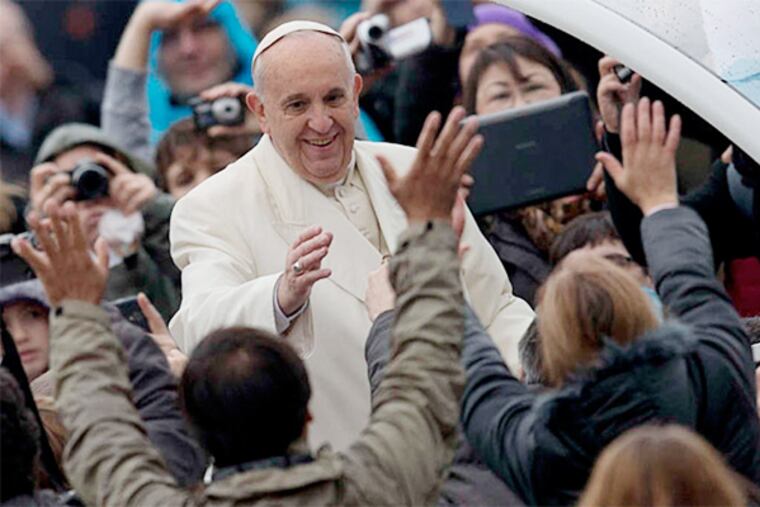Final Phila. hospital tally for papal visit: $6-million
The Delaware Valley Healthcare Council estimates that local hospitals spent $6 million to deal with the visit of Pope Francis, a tidy sum when all of health care is under pressure to reduce costs.

The Delaware Valley Healthcare Council estimates that local hospitals spent $6 million to deal with the visit of Pope Francis, a tidy sum when all of health care is under pressure to reduce costs.
But the hospital trade group and hospital leaders, who had no say in whether to invite the charismatic pontiff, are taking the high road. They had no complaints about the cost of preparing for huge crowds and mass medical emergencies that did not materialize.
"It's somewhat a cost of doing business and it's the nature of our business," said Mark Ross, regional emergency preparedness manager for the Hospital and Healthsystem Association of Pennsylvania, DVHC's parent organization.
"It was expensive, but it was a positive experience," said P.J. Brennan, chief medical officer for Penn Medicine, who slept in his office during the pope's visit. He said there were "miscalculations" about the event, but the experience was valuable for refining emergency planning - which seems even more important now in light of terrorist attacks in Paris and San Bernardino, Calif. - and good for Philadelphia.
"I tend to think of this on a civic scale," he said, "and I think the net result of this was a very positive thing for the city."
Richard Webster, president of Thomas Jefferson University Hospital, said he saw the extra cost as part of the hospital's mission during what was for many a once-in-a-lifetime experience. He hopes it reminds politicians eager for more tax revenue of the community benefit nonprofit hospitals provide.
"My hope out of this is it reinforces to some of our government officials the value and the role that hospitals do play," Webster said.
The city said its departments spent $17 million on the visit. It has billed the World Meeting of Families for $9 million of that. Hospitals will not be reimbursed.
They brought in extra employees during the visit, as well as lots of food for them and tons of sleeping supplies: cots, air mattresses, sheets, pillows, and towels. They also reduced patient loads before the weekend because of traffic concerns and worries about a big influx of patients from the papal events.
DVHC's poll included eight health systems and nine hospitals, for a total of 32 hospitals in Philadelphia and nearby suburbs. The organization asked about money spent on increased staffing, sleeping accommodations, and other resources and services needed to prepare for the papal visit.
The Inquirer asked some of the hospitals and health systems most affected by the visit how much they spent. The totals they reported included $1 million at Children's Hospital of Philadelphia, $200,000 at Hahnemann University Hospital, $1.5 million at Main Line Health, $500,000 at Jefferson, and $1.5 million at the University of Pennsylvania Health System. Temple University Hospital included lost patient revenue in the $520,000 it said the visit cost.
Because of worries about travel into and out of Philadelphia's closed traffic box, city hospitals asked unusually large numbers of employees to sleep over. They planned entertainment, such as Eagles viewing parties, to keep staffers occupied. That ended up being good for "esprit de corps," Brennan said.
From a medical standpoint, the weekend of the pope's visit was unusually quiet.
"It was like Christmas, which is the quietest day of all," Brennan said. The emergency department waiting room at the Hospital of the University of Pennsylvania was empty most of the weekend. From midnight Friday to midnight Saturday, Pennsylvania Hospital, in the heart of the papal-visit area, had only 30 visitors. Normally, it would have 30 at a time, Brennan said. "That's a trickle."
Jefferson was quiet, too. Joe Anton, vice president of clinical and support services, said volume was well below what the Center City hospital would expect on a normal weekend.
Demand may have been unexpectedly low because the papal crowd was not loaded with old and sick people hoping for miracles. Instead, Brennan said, there were a lot of younger families who, unlike, say, rock concert patrons, steered clear of substances that might have sent them to the ER.
Webster said hospital staff seemed to have a good time. It was easy to get into nearby restaurants when they weren't working and they were within walking distance of papal events. They joked about the piped-in music in the shower trucks and praised the food.
"It was really a positive vibe," Webster said. "We fed them really well. I heard more compliments about the food."
Ross said some of what hospital officials learned about planning was too secret to talk about.
A not-so-secret finding: employees prefer air mattresses to cots.
215-854-4944
@StaceyABurling